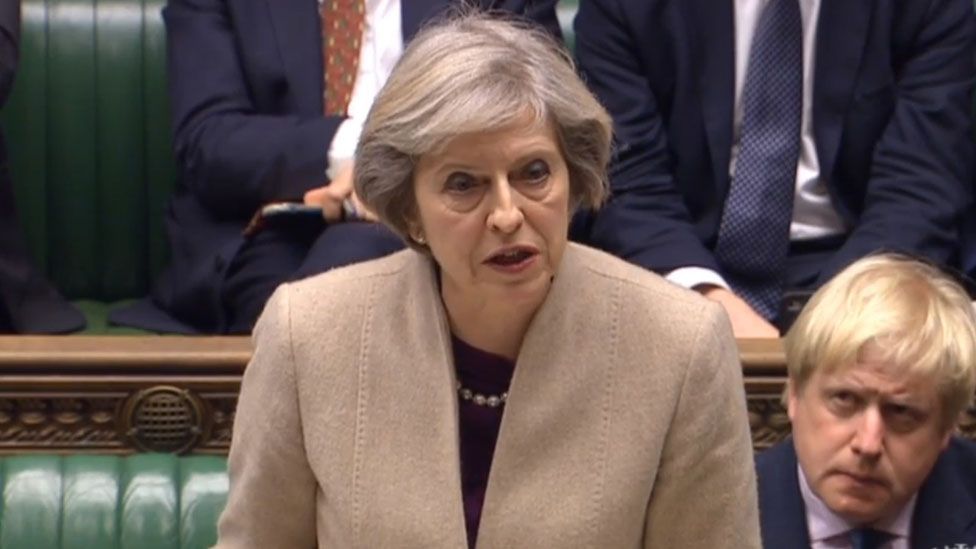PM Theresa May to look 'seriously' at Scottish government's post-Brexit paper
- Published

Prime Minister Theresa May said she would "look seriously" at the Scottish government's post-Brexit hopes.
First Minister Nicola Sturgeon is due to make public what she would like for Scotland after the UK ends its membership of the European Union.
Mrs May told the Commons she had spoken to Ms Sturgeon, but stressed that leave talks would take place at a UK level.
The PM's comments came as Scottish fishermen told MPs that their industry did not need the EU's single market.
On Monday morning, the Exiting the EU Committee held an evidence session for oil and gas and fishing sector leaders in Aberdeen.
Bertie Armstrong from the Scottish Fishermen's Federation said the industry should not be part of a "30 pieces of silver deal" over Brexit.
At the same meeting, oil and gas industry figures backed remaining inside European energy markets.
Other witnesses called on the UK government to provide more information on Brexit plans to ease uncertainty, and backed "transition arrangements" to smooth the process of leaving the EU.
Ongoing talks
On Tuesday, the Scottish government is scheduled to publish a paper titled "Scotland's place in Europe" which is likely to include plans on how Scotland could remain in the single market and a call for new devolved powers for Holyrood.
Following Mrs May's Brexit statement to the House of Commons, she was asked by the SNP's Westminster leader, Angus Robertson, if she would meet Ms Sturgeon to discuss the Scotland paper.
The PM replied that she would look "seriously" at the plan once it was published.
She said she welcomed the fact the Scottish government was looking at its priorities and she encouraged all the devolved administrations to do the same.
Mrs May added that there was already a structure in place, in the form of the Joint Ministerial Committee, for the devolved administrations to discuss issues related to Brexit.
Ahead of the PM's Commons address, members of the Exiting the EU Committee were in Aberdeen taking evidence on Brexit.
The issue of the UK leaving Europe's single market was addressed.
Fishermen's leader, Mr Armstrong, told MPs: "I would like to see very much a change in the rhetoric of 'we must be in the single market'.
"We're not going to be in the single market. We don't need the single market, we need an adequate market in order to press our products abroad."
Mr Armstrong added that an end to the tariff-free arrangements the single market provides would not be a "disaster".
He said: "Let us not be frightened to death by tariffs at all. Some small tariffs would not necessarily be a disaster. Particularly as the other side of that coin is that you may access new markets like, for example, India."
The SFF chief also said he "very much" feared that the fishing industry might be "sold out" as part of the Brexit negotiations, adding that fish stocks should be used "for the benefit of the United Kingdom".
However, Deirdre Michie from Oil and Gas UK argued that access to the EU's energy markets was very important.
She said: "We obviously trade gas across in pipelines to Europe. This is a significant security of energy supply, so we need to make sure that we have access and a level playing field in terms of tariffs and commercial codes.
"We want to stay part of the internal energy market, because if you think about the actual infrastructure, we are linked. We are a net importer of gas, but obviously we export say in the summer, when we have extra capacity.
"So all our gas is being traded through into Europe, into Belgium and the Netherlands, so from a gas point of view it's very important that we are clear about how we are going to manage that going forward."
Transitional arrangements
Ms Michie also said the industry was looking for "continuity and predictably" in legislation, saying the UK had been instrumental in drawing up many existing EU laws.
She added that the oil and gas industry was already under pressure, saying "any additional burdens" would be "significant".
She said: "We're a global industry, so we need to see continued movement of goods and services and people, and obviously limiting any tariff or non-tariff barriers is very important in that regard."
This point on freedom of movement was echoed by Andrew Walker from accountancy firm Johnston Carmichael, who said oil and gas was an "international business".
Both also said there should be transitional arrangements to avoid business being left in limbo during the Article 50 process.
Mr Walker said something had to be done to prompt investment to continue during this time, adding: "If there is a time window, say it's a two year period, all you'll have is people doing nothing for two years.
"That's the worst thing that could happen, when everything stops. We saw that back in 2007/08 with the financial crisis, people just stopped doing anything and that had a huge impact on a lot of industries."
- Published19 December 2016
- Published14 December 2016
- Published26 October 2016